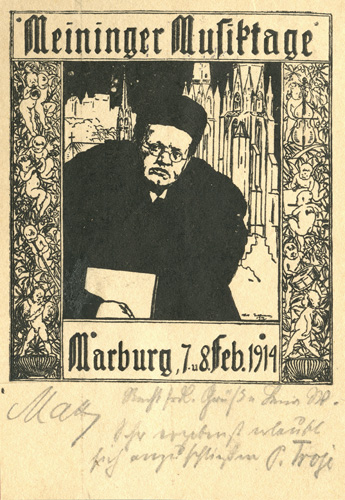1. Meiningen

Completely overwrought and overworked, Reger can only keep up his inhuman programme with the help of alcohol. In February, he collapses after a concert in Hagen, has to cancel all appearances and finally (on 1 July) gives up his position as Court kapellmeister. But already on his sickbed, expressly forbidden to compose, he begins to regain his creative momentum with instrumentations of lieder of his own and by Schubert. The most fruitful result of a stay at a health resort in Merano and a subsequent recuperative holiday in Schneewinkl are the Mozart Variations, Op. 132, probably Reger’s most popular work. In sentimental longing and distance to Mozart, he defines his own position, with references of his most recent orchestral works he gives a wistful look back to the Meiningen period, to which he owes his brilliant mastery of instrumentation.
The outbreak of World War I hits Reger in the summer break during the most intense compositional work. After having completed a Piano Quartet in A minor, Op. 133, the lively Telemann Variations, Op. 134, and the orchestral lied Hymnus der Liebe, Op. 136, in the first month of the war, he seems to fall into the general war euphoria with the Vaterländische Ouvertüre, Op. 140, dedicated to the German army.1. But during its final revision he already turns to a Latin Requiem (WoO V/9), which he wants to dedicate to the fallen. The rejection of this highly expressive work of the greatest dimension by his friend and critical advisor Karl Straube causes him to abandon the composition, which had already progressed well, while working on the second movement, a Dies Irae full of apocalyptic visions. His life-long dream of a choral-orchestral large-scale work has failed.
Postal items from this year whose sender or addressee is Max Reger.
Images from the Max Reger Foto Gallery that originate from this year and have a direct reference to Max Reger.
Reference
Max Reger Biography – 1914, in: Max-Reger-Portal, www.maxreger.info/biography/1914, Max Reger Biography Data, V. 3.2.0, last check: 6th July 2025.